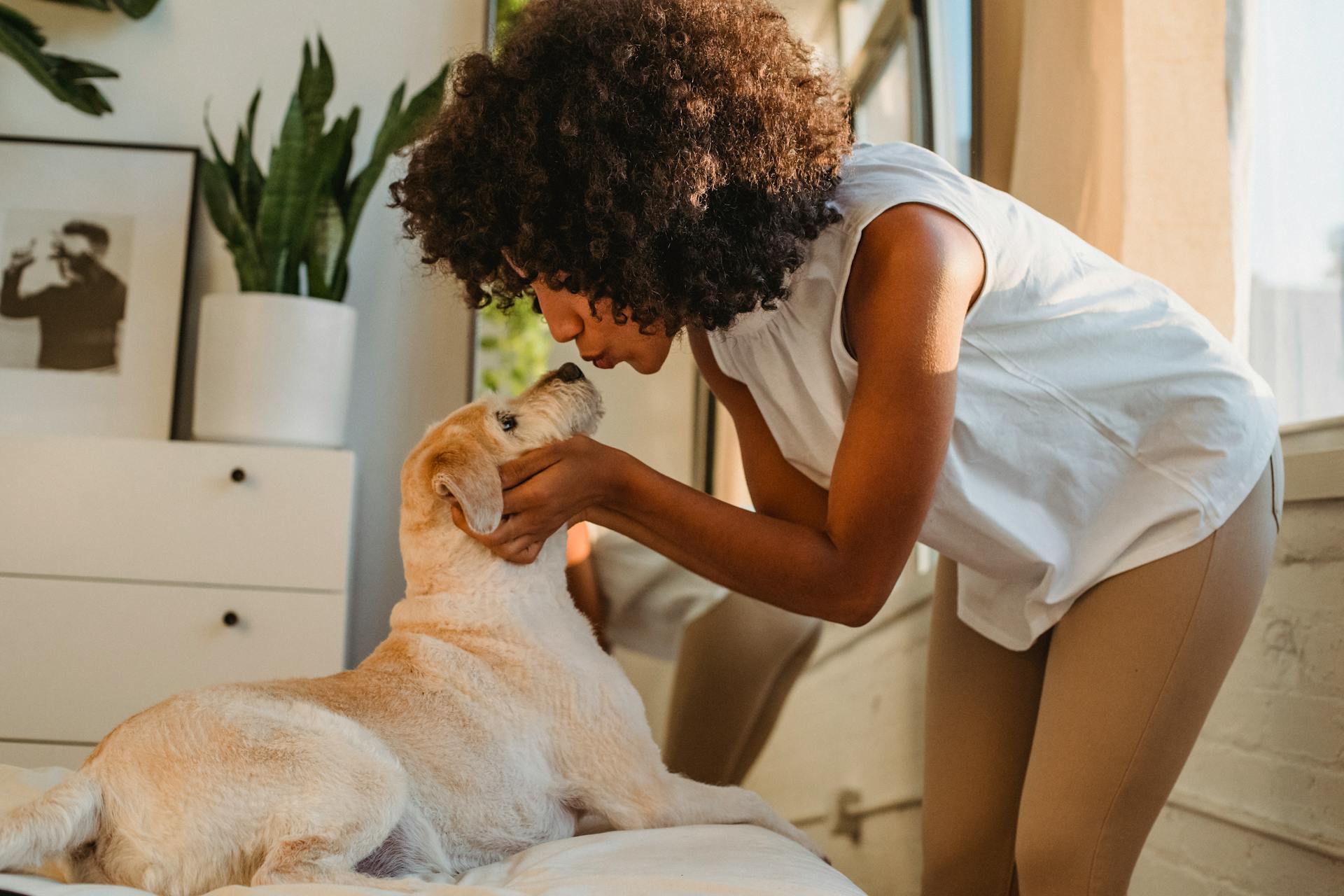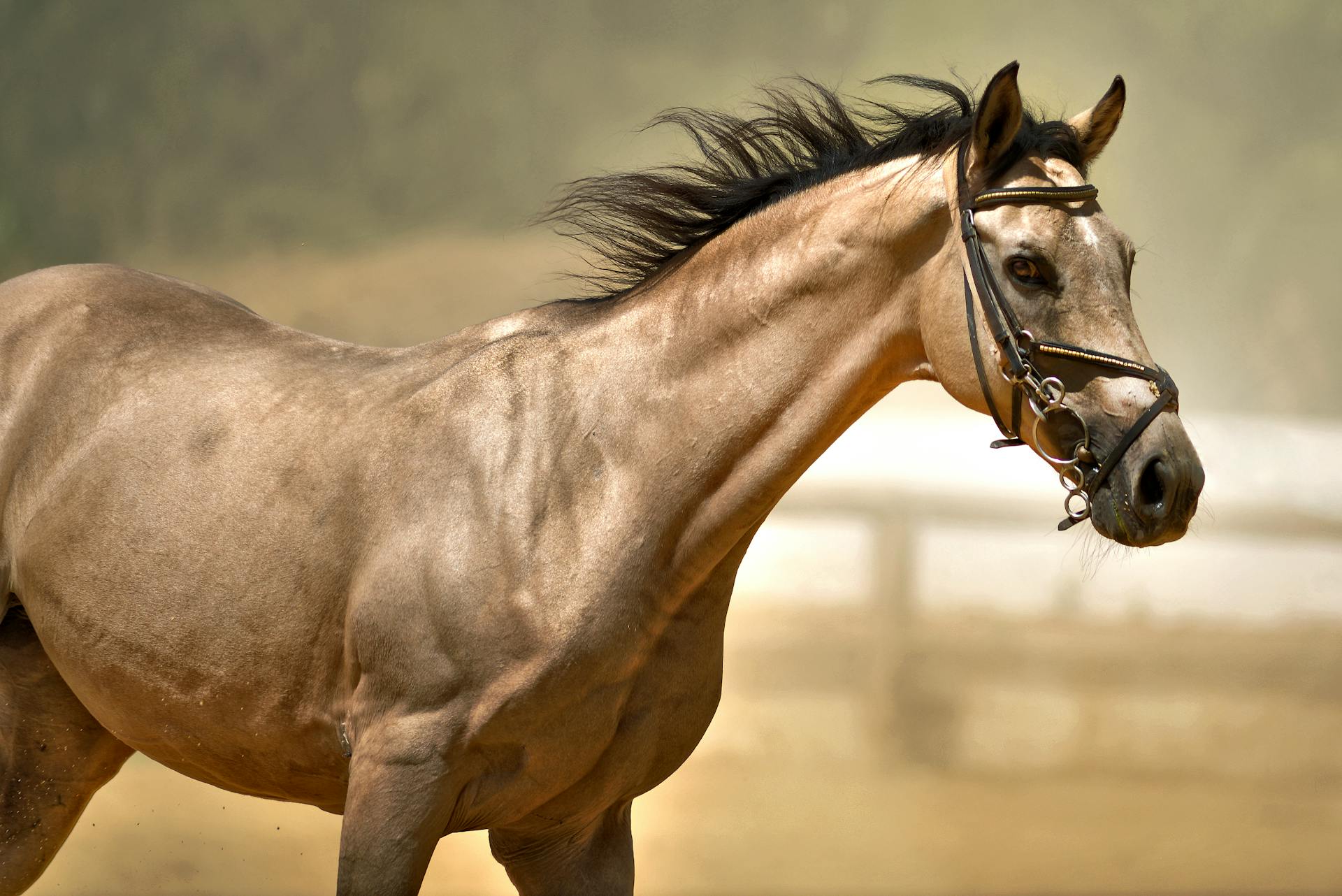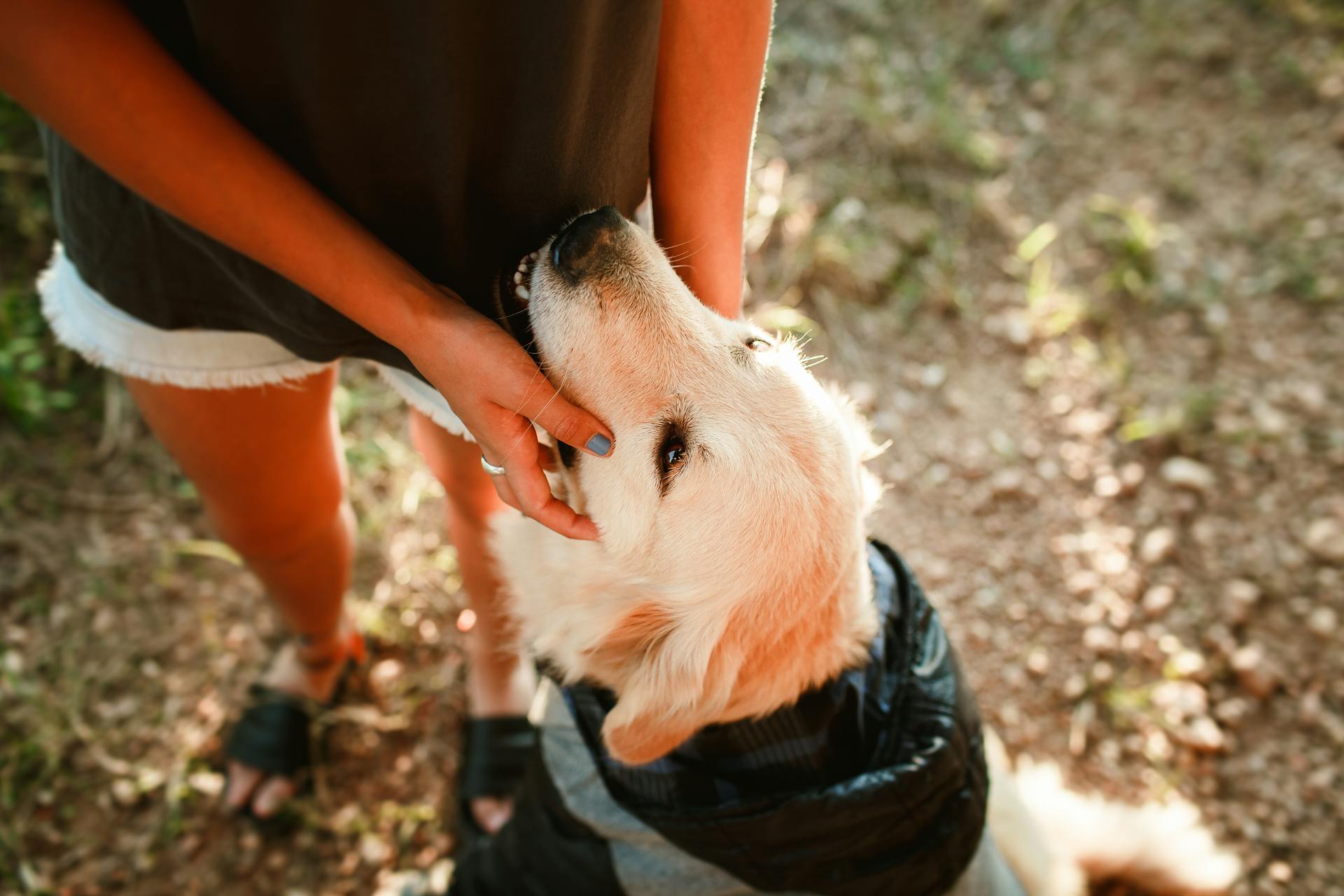
Golden Retrievers have been one of the most popular breeds for decades, and for good reason - they're known for their friendly, gentle, and patient nature.
One of the key characteristics of Golden Retrievers is their intelligence, which ranks them 4th in Stanley Coren's book "The Intelligence of Dogs". This intelligence makes them highly trainable, which is why they're often used as therapy dogs, search and rescue dogs, and service dogs.
Golden Retrievers are also natural athletes, built for active lifestyles. According to the American Kennel Club, they require daily exercise to stay happy and healthy, which can include walks, runs, and playtime in the yard.
Their thick coats require regular grooming, but it's a small price to pay for their loyalty and affection.
Curious to learn more? Check out: Double Coated Golden Retriever
Physical Characteristics
Golden Retrievers are a medium-sized breed of dog, with males standing between 56 to 61 centimeters (22 to 24 in) tall and weighing between 25 and 34 kilograms (55 and 75 lb). Females typically stand between 51 to 56 centimeters (20 to 22 in) tall and weigh the same as males.
Their broad head has a well-defined stop, with dark eyes set well apart, and a wide and powerful muzzle. The nose is usually black or brown, but may fade to pink in cold weather, a condition known as "snow nose."
Golden Retrievers have a muscular neck and loose-fitting skin, with shoulders that are well laid-back and long-bladed. Their body is deep through the chest, with well-sprung ribs, and a level back from withers to croup.
Their double coat is a striking feature, with a long, flat or wavy outer coat and a dense undercoat that provides weather resistance. The coat can be any shade of cream, yellow or gold, but is typically paler with age.
Here are the key physical characteristics of Golden Retrievers:
- Ears: Floppy, with a gentle V shape
- Eyes: Dark- to medium-brown, with a friendly and intelligent expression
- Nose: Black or brown, may fade to pink in cold weather
- Coat: Medium-length double coat, with a soft undercoat and a thick, water-resistant outer coat
- Tail: Long and feathery, carried with a "merry action"
Temperament and Personality
Golden Retrievers are naturally outgoing and eager to please, making them excellent family dogs.
Their friendly demeanor makes them thrive in homes with lively environments, and they love people and social outings.
Most Goldens are born to mingle and see everyone as a potential new best friend, often saying, "Hi! I am so glad we met. Do you have a ball to throw for me now that we’re friends?"
Golden Retrievers are gentle and kind, known for their deep-rooted desire to please their owners, which makes them an ideal breed for families with young children.
They're generally easy to train due to their intelligence and quick learning abilities, and they're often used as guide dogs, therapy dogs, and search-and-rescue dogs.
Golden Retrievers are social dogs that thrive on interaction with their human families and may exhibit signs of separation anxiety if left alone for long periods.
They're also known for being clingy, which is a sign of their loyalty and affectionate nature.
Their friendly and loving nature makes them one of the breeds most inclined to seek out and enjoy cuddling.
In fact, Golden Retrievers will often nudge you gently so that you continue to pet them, showing how much they adore their owner.
Their love and ability to play fetch is also a testament to their affectionate nature, and it's no surprise that they're known to help treat depression.
Their incredibly soft mouth grip is also a unique trait that makes them a great breed for families, and they're even able to hold a raw egg in their mouth and carry it around without breaking it.
Recommended read: Hemangiosarcoma Golden Retriever
Care and Maintenance
Golden Retrievers are adaptable and easygoing, but they're not low-maintenance. They need daily exercise.
Regular brushing is a must, especially to prevent matting behind their ears and on their hind limbs.
Golden Retrievers have a double coat, which means they shed a lot. They shed so much that they need to be brushed at least once or twice every week.
Their double coat also requires regular grooming to keep it healthy. This can be done at home or by a professional groomer.
Golden Retrievers have a moderate amount of energy, even in their senior years. They enjoy activities like running, going on long walks, retrieving, and swimming.
Establishing a daily exercise routine is essential for Golden Retrievers. This will keep them happy and healthy.
Golden Retrievers have a thick, long coat that's prone to matting. Consistent grooming and brushing are necessary to keep their coat healthy and manage their shedding.
They shed so much that they need to be raked out more frequently during high-shed times, such as in the spring and fall.
A fresh viewpoint: Best Healthy Dog Biscuits
Health and Longevity
Golden Retrievers have a life expectancy of 10 to 12 years, but this can vary depending on factors like weight, fitness level, and illness. With proper care and attention, some Golden Retrievers can live up to 14 years without issue.
Their biggest health concern is cancer, with up to 65% of Golden Retrievers dying from cancer-related causes. This is often due to lymphoma or hemangiosarcoma, and your vet will help determine the best course of treatment if your pup is diagnosed.
Golden Retrievers are also prone to skin infections and allergies, which can be caused by their thick undercoat attracting bacteria. Keep an eye out for excessive itching or redness/rashes on their skin, and make an appointment with your veterinarian if you notice anything unusual.
Here are some common health issues Golden Retrievers may face:
- Cancer
- Skin infections and allergies
- Hip dysplasia
- Heart conditions (like subaortic stenosis)
- Hypothyroidism
- Eye conditions (like pigmentary uveitis or progressive retinal atrophy)
Despite these potential health issues, Golden Retrievers have an average lifespan of 10-13 years, making them a great choice for a long-term companion.
Health

Golden Retrievers are generally healthy dogs, but like all breeds, they can be prone to certain health issues. The average lifespan of a Golden Retriever is 10-12 years, but some can live up to 14 years without issue.
Cancer is a significant health concern for Golden Retrievers, with up to 65% of them dying from cancer-related causes. The most common types of cancer in Golden Retrievers are lymphoma and hemangiosarcoma.
Skin infections and allergies are also common in Golden Retrievers, often caused by their thick undercoat attracting skin-irritating bacteria. If your Golden is itching excessively or showing signs of skin rashes, it's essential to consult with your veterinarian.
Hip dysplasia affects around 8.5% of Golden Retrievers, causing looseness in the hip joint and potentially leading to degenerative joint disease and arthritis. Treatment options may include joint supplements, medication, and in severe cases, surgery.
Heart conditions, such as subaortic stenosis, can also affect Golden Retrievers, often detected as an audible murmur during a veterinary exam. If a murmur is detected, your veterinarian will likely refer your pup to a veterinary cardiologist for further testing.
Discover more: Embark Dog Dna Test Breed & Health Kit Stores
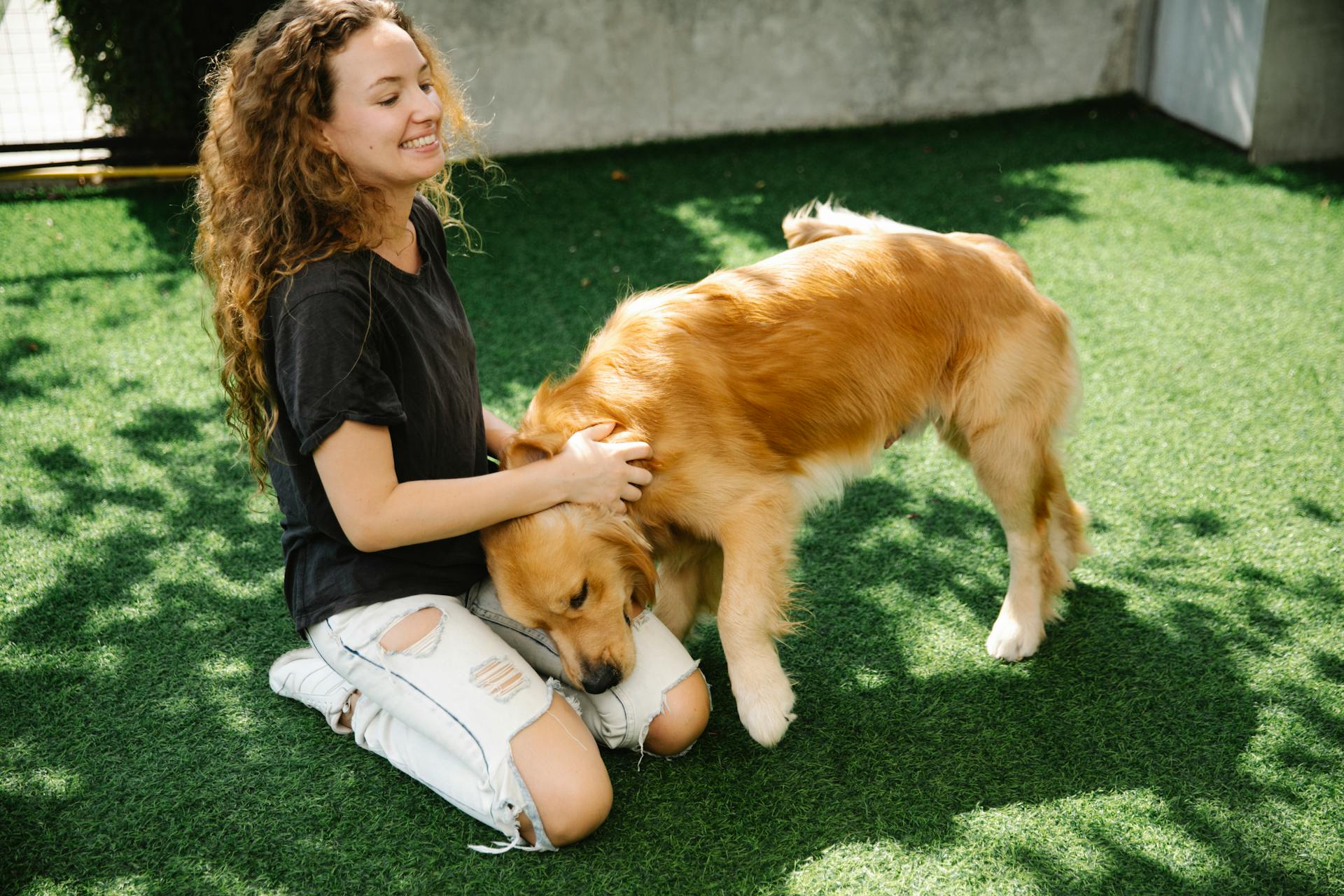
Some Golden Retrievers are also prone to hypothyroidism, a condition where the thyroid gland doesn't produce enough hormones. Symptoms of hypothyroidism include lethargy, hair loss, and weight gain.
Here are some common health issues in Golden Retrievers:
- Cancer: lymphoma, hemangiosarcoma
- Skin infections and allergies
- Hip dysplasia
- Heart conditions: subaortic stenosis
- Hypothyroidism
- Pigmentary uveitis: an inherited eye condition
- Progressive retinal atrophy (PRA): a disease leading to blindness
Have Long Lifespans
Golden Retrievers have a relatively long lifespan of 10 – 13 years, considering they're a larger breed. This means you can enjoy a decade or more of companionship with your furry friend.
Studies show that owning a dog can have a positive impact on your health, particularly when it comes to cardiovascular disease. Owning a dog, especially a hunting breed like a Golden Retriever, can reduce your risk for cardiovascular disease.
Playing with your dog can be a great way to relieve stress and lift your mood, even after a long day. Exercise is also a natural byproduct of owning a high-energy breed like a Golden Retriever, which can motivate you to get moving.
Suggestion: Long Haired Chinese Shar Pei
History and Breeding
The Golden Retriever breed originated in the Scottish Highlands through the efforts of Dudley Marjoribanks, the first Lord Tweedmouth.
Marjoribanks selectively bred different dog breeds to create an energetic pup who could retrieve objects from the water and on land. He used breeds like the Yellow Retriever, Irish Setter, Bloodhound, and now-extinct Tweed Water Spaniel in his breeding program.
Golden Retrievers began arriving in the United States in the early 1900s and gained recognition from the AKC in 1925.
Intriguing read: Dogs Breeds That Start with B
History
The Golden Retriever breed originated in the Scottish Highlands through the efforts of Dudley Marjoribanks, the first Lord Tweedmouth.
Dudley Marjoribanks selectively bred different dog breeds to create an energetic pup who could retrieve objects from the water and on land. He used breeds like the Yellow Retriever, Irish Setter, Bloodhound, and now-extinct Tweed Water Spaniel in his breeding program.
The Golden Retriever breed was developed with speed, agility, and loyalty in mind. Goldens began arriving in the United States in the early 1900s and gained recognition from the AKC in 1925.
Their popularity skyrocketed when President Gerald Ford had a Golden Retriever of his own named Liberty.
Notable
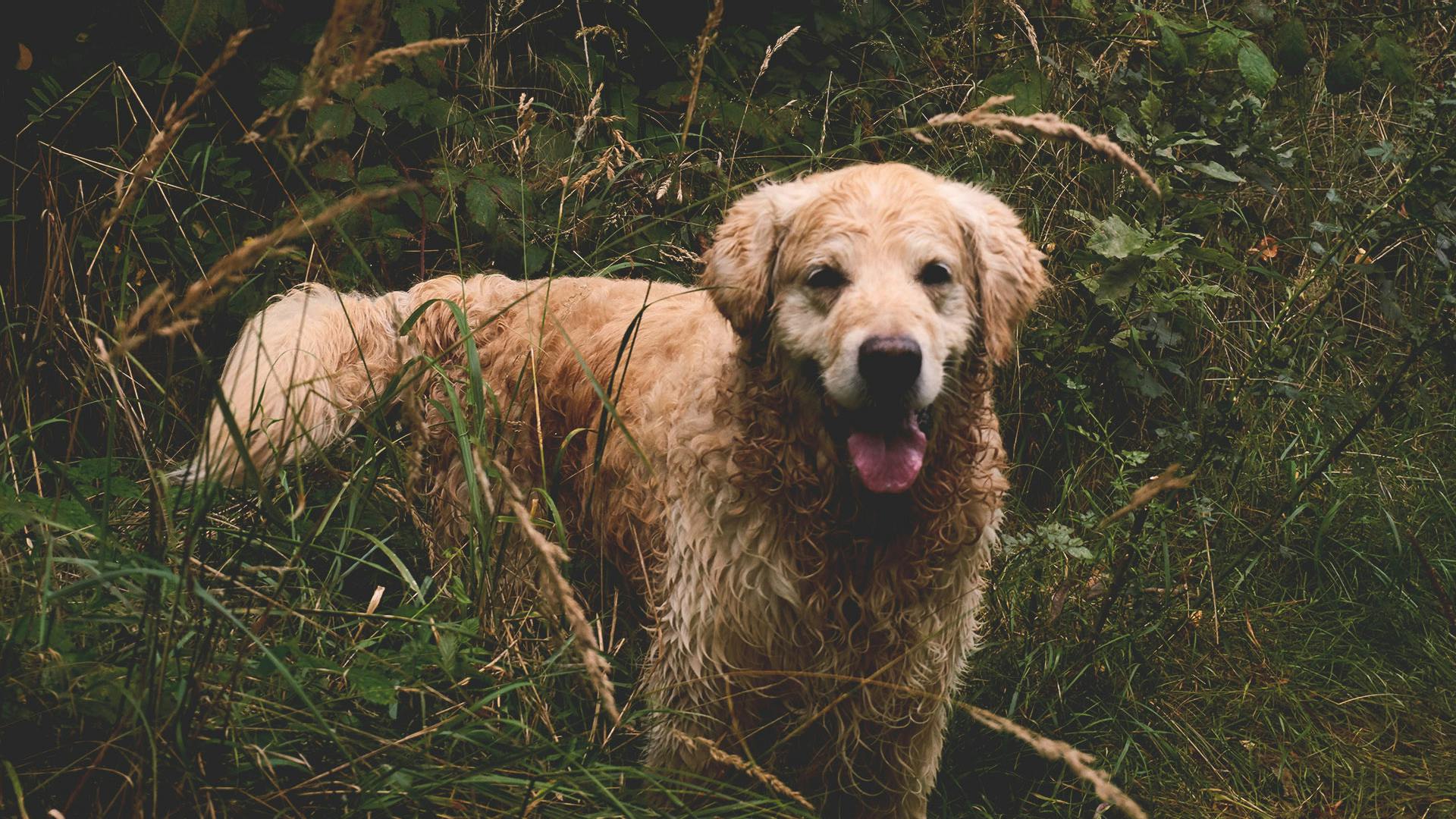
Notable Golden Retrievers have made a significant impact in various fields. Liberty, the presidential pet of President Gerald R. Ford, was a beloved member of the White House family.
Bailey, the pet of 2020 US presidential candidate Elizabeth Warren, was a loyal companion. This shows that Golden Retrievers can form strong bonds with people in high-profile positions.
Orca, a PDSA Gold Medal recipient, demonstrated exceptional bravery. This award is a testament to Orca's heroic actions.
Mayor Max, the elected Mayor of Idyllwild, California, held public office. This is a unique distinction for a Golden Retriever.
Buddy, the dog actor from the movie Air Bud, brought joy to audiences worldwide. His talent and charisma made him a household name.
Here are some notable Golden Retrievers in a list format:
- Liberty, presidential pet of President Gerald R. Ford.
- Bailey, pet of 2020 US presidential candidate Elizabeth Warren.
- Orca, PDSA Gold Medal recipient for bravery.
- Mayor Max, elected Mayor of Idyllwild, California.
- Buddy, dog actor (Air Bud)
Training and Behavior
Golden Retrievers are highly intelligent and eager to please, making them a joy to train. They can easily master basic obedience training commands like sit and stay, and can even be taught to retrieve different toys by name.
Using positive reinforcement training methods, which involve treats or toys as rewards for desirable behavior, is key to successful training. This approach helps Golden Retrievers learn quickly and retain information.
Individual personalities play a big role in determining how well a Golden Retriever will respond to training, especially if you're aiming for a specific job like service dog work. Some Golden Retrievers may be more inclined to goof off than learn their lessons, so be patient and adjust your approach accordingly.
Golden Retrievers are naturally curious and love to explore their surroundings, which can sometimes lead to unwanted behaviors like eating things they shouldn't. Keeping a watchful eye on them, especially during puppyhood, is crucial to preventing digestive issues or gastrointestinal obstructions.
With proper training and exercise, Golden Retrievers can be happy and healthy companions. They require lots of physical exercise and mental stimulation to keep their brains busy, so make sure to provide them with plenty of activities and toys to keep them engaged.
Related reading: Golden Retrievers Good Hiking Dogs
Behavior and Training
Golden Retrievers are known to be one of the smartest dog breeds, ranking as the fourth smartest behind border collies, poodles, and German shepherds.
Their intelligence makes them highly trainable, and they respond best to positive reinforcement training, which uses treats or toys as rewards for desirable behavior.
Golden Retrievers are eager to please and have a kind temperament, making them a joy to train. They can easily master basic obedience training commands like sit and stay.
However, they can also get bored if they don't receive enough physical and mental stimulation, leading to undesirable behaviors like eating things they shouldn't.
To keep your Golden Retriever happy and healthy, provide them with plenty of exercise and mental stimulation, such as playing fetch, offering interactive dog toys, and taking daily walks.
Here are some ways to keep your Golden Retriever busy and engaged:
- Play games like fetch and chase
- Offer interactive dog toys
- Provide unstructured off-leash time
- Take daily walks
- Take them swimming (if possible)
With consistent training and socialization, Golden Retrievers can become confident and well-behaved dogs. They're also great listeners when given direction, making them a great choice for people looking to teach a dog to handle tasks other breeds just cannot.
Explanatory Notes

Sir Dudley Marjoribanks' acquisition of Nous is a matter of debate, with some accounts suggesting it happened in 1865 and others in 1868.
The Golden Retriever was often called the 'Wavy-coated Retriever, Golden' in the 19th century, a name that reflects its distinctive coat.
Charlesworth was a strong advocate for Golden Retrievers to be shown in field trials, and she was vocal in her criticism of handlers who only showed their dogs without competing.
Dogs that meet the American Kennel Club's standards should stand between 23 and 24 inches tall, while bitches should stand between 21.5 and 22.5 inches tall.
FAQs
Our puppies are raised by our own group of small, independent breeders who lovingly care for and socialize with each of them daily.
We take all the extra steps to provide the best healthcare for them, which helps them grow up happy and healthy.
All our puppies are raised by our own group of small, independent breeders who lovingly care for and socialize with each of them daily so they grow up happy.
For your interest: Smartest Miniature Dog Breeds
Lifestyle and Compatibility
Golden Retrievers are a great fit for families with young children, as they have extremely soft mouths and are energetic playmates who keep their puppy-like behavior well into adulthood.
Their friendly and docile nature makes them an excellent addition to households with multiple pets, including cats, rodents, horses, pigs, and other dogs.
Golden Retrievers are known for being good with children and other pets, and are well-suited for families.
Their gentle temperament and strong desire to please their owners make them an excellent house dog, perfect for families who want a loyal companion.
Golden Retrievers are incredibly social and outgoing, which means they'll get along great with all your other pets and become best friends with them.
Related reading: Are Corgis Nice
Nutrition and Feeding
Golden Retrievers love to eat, so it's essential to choose a high-quality food that meets their nutritional needs. AAFCO-compliant food is a great place to start.
Feeding your Golden Retriever puppy requires a large-breed, high-quality puppy formula until they're 12-18 months old. Your veterinarian can help you narrow down your options to find the best food for your dog.
Golden Retrievers do well with twice-daily feedings, in the morning and evening, once they reach maturity. This can help prevent digestion issues and keep them healthy.
It's crucial to monitor your Golden Retriever's weight and body condition with your veterinarian to ensure they're not growing too much too fast. This can help prevent joint problems and other health issues.
A complete and balanced commercial dog food is generally recommended for Golden Retrievers, but every dog is different. Your veterinarian can help you determine the best diet for your dog based on their age, weight, and activity level.
Discover more: How Much Should a Rat Terrier Weigh
Dog Nutrition
Golden Retrievers have specific nutritional needs that vary depending on their age and activity level. A large-breed, high-quality puppy formula is best for Golden Retriever puppies until they're 12-18 months old.
To choose the right food for your Golden Retriever, look for AAFCO-compliant food and consult with your veterinarian for recommendations. They can help you narrow down options to find the best food for your dog.
Golden Retrievers love to eat, so it's essential to use a slow feeder bowl or interactive food puzzle to help them slow down their eating and prevent digestion issues. This can also make mealtime more fun for your dog.
Full-grown Golden Retrievers do well with twice-daily feedings in the morning and evening. Golden Retriever puppies, on the other hand, need to eat more frequently, about three or four times a day on a consistent schedule.
To determine how much to feed your Golden Retriever, follow the feeding guidelines on the back of the puppy food bag based on their age and expected body weight. Your veterinarian can also help you check your puppy's weight and body condition to ensure they're not growing too much too fast.
Healthy Golden Retrievers eating an AAFCO-compliant diet receive a complete and balanced diet, making added vitamins and minerals unnecessary. However, if your Golden has a medical condition, your vet may recommend dog-formulated supplements.
It's crucial to talk to your vet before giving your pup any supplements, as they can recommend joint supplements to help slow joint damage and inflammation. Omega-3 fatty acid supplements can also help reduce inflammation in the joints and skin, making the coat more lustrous.
Suggestion: English Cream Golden Retriever Weight Chart
Love Water
Golden Retrievers are a breed that absolutely adore the water. They have a special two-layer coat that keeps them warm and repels water, making them naturally great at swimming.
Their love of water is not just a coincidence - they were bred for hunting purposes and were often used to fetch waterfowl. This historical background has made them a popular choice for families who enjoy water activities.
Golden Retrievers can be taught to swim even better, and they love playing water games.
Frequently Asked Questions
Which Golden Retriever is best?
For families, the American Golden Retriever is often a top choice due to its lanky build and 'feathery' fur. Consider this breed if you're looking for a friendly and adaptable companion.
Why are Golden Retrievers the best family dogs?
Golden Retrievers are ideal family dogs due to their gentle nature, loyalty, and eagerness to please, making them a great fit for families with children and other pets. Their high energy level also ensures they'll keep up with active families who love to play and stay outdoors.
Sources
- https://en.wikipedia.org/wiki/Golden_Retriever
- https://be.chewy.com/dog-breed/golden-retriever/
- https://www.petmd.com/dog/breeds/golden-retriever
- https://www.mygoldenretrieverpuppies.com/blog/why-golden-retrievers-are-the-best
- https://www.thepuppyacademy.com/blog/2022/1/24/a-guide-to-puppy-breeds-golden-retrievers
Featured Images: pexels.com
